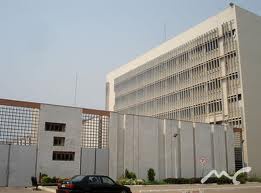 Bank of Ghana
Bank of Ghana
Members of the God is Love Fun Club in Sunyani, have planned to hit the streets of Sunyani to protest against the Bank of Ghana (BoG), and its Governor, Dr Kofi Wampah.
According to the group, numbering about 10,000, its decision to embark on the demonstration is due to the failure of the Central Bank, to obey an order from a high court to defreeze the accounts of the Club.
About five months ago, the Financial Intelligence Centre of the BoG announced a moratorium on activities of the Fun Club and other financial institutions and therefore froze the accounts of the body, which contained monthly contributions of members.
A letter of notification signed by Nana Kwame Benkae, spokesman of the group, and copied to the Ghana News Agency on Tuesday in Sunyani, said the demonstration would be organised on Friday October 9.
The letter was copied to the Brong-Ahafo Regional Police Command, Sunyani Municipal Police Command and Management of the God is Love Fun Club.
It said the demonstrators would converge at the Sunyani Post Office around 0900 hours, and parade through some principal streets of the Sunyani township.
According to the letter, a High Court in Kumasi presided by Justice Emmanuel Amo Yartey has ordered the BoG to give access to the Fun Club’s accounts at the UNIBANK Ghana Limited but the Central Bank has failed to do so.
Meanwhile, the Group has called on President John Dramani Mahama to as a matter of urgency intervene for the Club to access the account.
A petition, jointly signed by Nana Benkae, Eric Adjei and Kwame Baffoe, leaders of the group appealed to the Chief Justice Mrs. Georgina Theodora Wood and all relevant state institutions to also intervene.
It explained that “God is Love is a registered Fun Club and do perform its functions and operations as required by law”.
“As members of the Club we do contribute monthly dues towards our activities, especially assisting orphanage homes and granting scholarships to brilliant but needy students”, it said.
The petition stated that currently the club is sponsoring about 200 students in the second cycle and tertiary institutions.